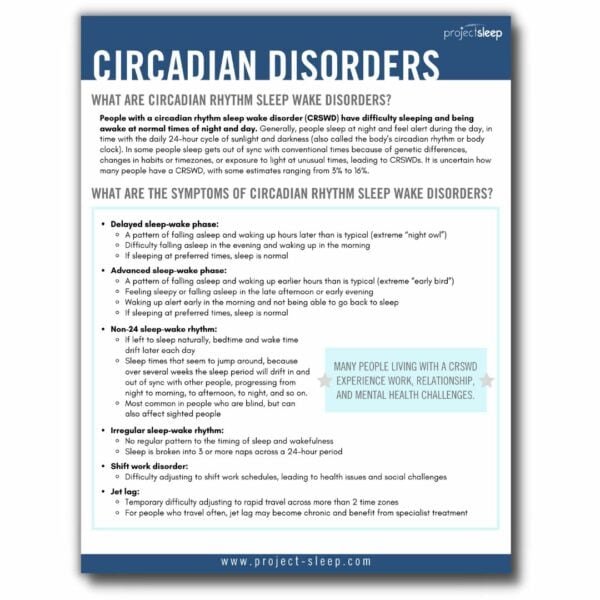Circadian rhythm sleep wake disorders (CRSWDs) are neurological disorders in which the sleep-wake cycle is out of sync with the day-night cycle.
Circadian Rhythm Sleep Wake Disorders
What are circadian rhythm sleep wake disorders (CRSWDs)?
Generally, people sleep at night and feel alert during the day, in time with the daily 24-hour cycle of sunlight and darkness (also called the body’s circadian rhythm or body clock). People with a circadian rhythm sleep wake disorder (CRSWD) have difficulty sleeping and being awake at normal times of night and day.
Sleep can get out of sync with conventional times due to genetic differences, changes in habits or time zones, or exposure to light at unusual times, leading to CRSWDs. It is uncertain how many people have a CRSWD, with some estimates ranging from 3% to 16%.
It is uncertain how many people have a CRSWD. Some estimates range from 3% to 16%.
What do circadian rhythm sleep wake disorders look like?
People with CRSWDs may experience sleep deprivation, especially if trying to maintain socially conventional sleep schedules. This can lead to symptoms such as fatigue, sleepiness, difficulty concentrating, headaches, nausea, and moodiness while awake.
CRSWDs are often misinterpreted as signs of insomnia or depression.
People with CRSWDs may use substances to fall asleep (e.g. alcohol or sleeping pills) and stay awake (e.g. coffee or stimulants) at societally normal times, which can make sleep worse. CRSWDs are often misinterpreted as signs of insomnia or depression and can make it difficult to maintain relationships and meet work, school and social responsibilities.
Types of Circadian Rhythm Sleep Wake Disorders
Delayed sleep-wake phase:
- A pattern of falling asleep and waking up hours later than is typical (extreme “night owl”)
- Difficulty falling asleep in the evening and waking up in the morning
- If sleeping at preferred times, sleep is normal
Advanced sleep-wake phase:
- A pattern of falling asleep and waking up hours earlier than is typical (extreme “early bird”)
- Feeling sleepy or falling asleep in the late afternoon or early evening
- Waking up alert early in the morning and not being able to go back to sleep
- If sleeping at preferred times, sleep is normal
Non-24 sleep-wake rhythm:
- If left to sleep naturally, bedtime and wake time drift later each day
- Sleep times seem to jump around and drift in and out of sync with other people
- Most common in people who are blind, but can also affect sighted people
Irregular sleep-wake rhythm:
- No regular pattern to the timing of sleep and wakefulness
- Sleep is broken into 3 or more naps across a 24-hour period
Shift work disorder:
- Difficulty adjusting to shift work schedules
- Can lead to health issues and social challenges
Jet Lag:
- Temporary difficulty adjusting to rapid travel across more than 2 time zones
- For people who travel often, jet lag may become chronic and benefit from specialist treatment
How are circadian rhythm sleep wake disorders diagnosed?
Seeing a sleep specialist is recommended for people who are experiencing health problems or challenges in work, school, or social life related to their sleep timing.
A sleep specialist will ask about symptoms and sleep and do a medical and neurological exam. They may ask patients to track their sleep and wake patterns for several days or weeks by keeping a sleep diary and/or wearing an actigraph (a medical device that looks like a smartwatch).
A sleep study (also called polysomnography) is not required to diagnose CRSWDs but may be done to check for other sleep disorders. A sleep study may include stick-on sensors used to measure breathing, heart rate, brain activity, and body movements while asleep. The study can be done during an overnight stay in a sleep center/lab or at home. Home testing collects less information but may be more convenient for straightforward cases.
How are circadian rhythm sleep wake disorders treated?
The best choice of treatments for each person depends on the type and cause of CRSWD. They all revolve around getting sleep timing more in sync with society and the environment. Some treatments could include:
For some people, adapting their lifestyle to fit work/school/social schedules around a preferred sleep schedule (e.g. evening hobbies and working late shifts for people with delayed sleep phase disorder) is enough to resolve their CRSWD-related issues. Others may need additional treatments.
It is possible that other health conditions, including other sleep disorders, could be contributing to symptoms. Treating these other health conditions thus can help in treating the CRSWD.
Education, counseling, and cognitive behavioral therapy can all help with keeping healthy sleep habits and training the brain and body to sleep on a regular schedule.
Connecting with other people who have a CRSWD and their families can empower people to learn helpful strategies for living well.
For sighted people and certain types of blindness, carefully timed bright light therapy can help to adjust and maintain sleep-wake timing. Scheduling other behaviors such as eating and exercise can also help.
If used at appropriate doses and times, melatonin supplements and medications that affect melatonin receptors can help to adjust sleep timing.
Resources for People with CRSWDs
For resources and more information on CRSWDs, please visit the Circadian Sleep Disorders Network. Please also download our free, printable Circadian Disorders Fact Sheet for a handy resource to share with friends, family, and medical providers.

Social Media Shareables
Help raise awareness of non-24-hour sleep-wake disorder with your community by sharing these educational graphics! Sharing these graphics is also a great way to celebrate Non-24 (N24) Day annually on November 24th.

